- Home
- Richard Lee Byers
Dark Kingdoms
Dark Kingdoms Read online
dark kingdom& cover illustration jacket and book design art direction
DARK KINGDOMS: VOLUME I
ONE
James Graham, onetime Earl and Marquess of Montrose, now Anacreon of Stygia, stood in the bow of the Belleisle, the galleon rising and falling beneath him, his auburn lovelocks and heavy black robe stirring in the wind. His blue eyes peered intently into the seething darkness ahead, seeking a current of water or wind that might bear his vessel along faster than the sleek cruisers pursuing her, or a warp in space through which she might escape.
All he saw were the black swell, and faint veils of blue and purple light, not unlike the earthly aurora borealis, flickering across the starless sky. He hadn't expected any better result. Though privy to many of the arcane secrets of the proscribed Harbingers' guild, he was a landlubber. Captain Pizarro possessed the same skills and had been sailing the Sea of Shadows for more than a century. Still, Montrose hadn't been able to resist the temptation to look for some means of escape the mariner had missed. It was better than loitering uselessly on the quarter-deck.
He turned, peered backward, and tensed. For the last three hours, the six enemy ships had seemed to creep closer with excruciating slowness. Now, suddenly, they appeared nearly close enough to seize their prey.
Wondering for the hundredth time just who the raiders were, Soul-Pirates, Renegades, Heretics, Spectres, or, just conceivably, the covert agents of one of his master's fellow Deathlords, Montrose hurried aft. Some of his legionnaires, newly clad in uniforms embroidered with the sigil of the Order of the Unlidded Eye, clustered anxiously him. They were veteran soldiers, but, like their commander, most had never fought at sea.
"Are we going to be all right, milord?" asked one, a bald man with the massive chest and shoulders of a Spook.
How the devil should I know? Montrose thought. He forced a reassuring smile. "Of course we are. We're Black Hawks, aren't we? We should be grateful to the captain for finding us a little sport to break up the tedium of the voyage." He clapped the fool on the shoulder, then strode on.
Captain Pizarro was a squat fellow with a drooping, grizzled mustache. At some point in his postmortem existence, a flesh sculptor had surrounded his jet-black eyes with a mosaic of iridescent multicolored scales. Glowering, he was watching some of the sailors hang scrambling nets, while others spread sand on the deck. His mouth tightened at Montrose's approach. Probably he wished the landsman would refrain from bothering him at this critical time, though he might forebear to say so outright. The other wraith was his superior officer.
"They're going to catch us, milord," Pizarro said. "We have to fight."
"I understand," Montrose replied. "What are our chances?"
The captain shrugged. "We'll come about in a moment. Then, when they're in range, we'll start shooting broadsides into their bows. If we can cripple them before they maneuver into position to return fire, we'll win. If we can't, well, they have genuine warships and we only have transports, without all that many cannons or marines. But we'll do the best we can."
Montrose nodded. "Well, you and your officers are the ones who know what you're about, so of course you're in command. My men and I are at your disposal."
"Thank you for that," said Pizarro. "Truth to tell, it's more sense and less pride than I expected from a grandee newly descended from the Onyx Tower. Since your lads don't know their way around a ship, I doubt that I'll have any complicated orders for them. Tell them to shoot when they have something to shoot at, kiss the deck if somebody tells them to duck, and keep out of the way of the crew." He looked up at the topmen laboring aloft. Two of them, blessed with a Harbinger's power of levitation, floated from spar to spar and sheet to sheet like bees flitting from one flower to the next. "Give the signal!"
A thin, crop-haired woman kneeling on the fore-top cupped her hands around her mouth and emitted a long, ululating cry. After a moment the Chanteurs on the other two vessels in the convoy wailed back. The deck heeled beneath Montrose's feet as the helmsman brought the ship around. The timbers creaked and groaned.
Montrose returned to his men on the main-deck, where two sailors, their faces tattooed with faux deathmarks, were dispensing arms from a bin. There were some firearms, but more cutlasses, pikes, bows, and crossbows, weapons which, by Skinlands standards, were as archaic as the Belleisle itself. But in the world of the dead, where raw materials were always scarce, and guns and machines had to be powered by a ghost's own essence or the mystical substance known as soulfire, archaic implements were more the rule than the exception.
Montrose already had a darksteel rapier sheathed at his side and a .45 automatic, a Stygian artificer's copy of a Sig Sauer Model 220, hidden under his sable Inquisitor's robe, but he took a bow and a bundle of arrows. Almost four centuries ago, at St. Andrews University, he'd won the silver arrow two years running, but he hadn't practiced his archery in almost thirty years. He hoped he could still hit a mark.
After he strung the bow, there was nothing to do but wait, wait and say what he could to hearten his soldiers. Inwardly he seethed. He didn't fear the Final Death any more than he'd feared his first, but he resented being summarily expelled from the luxuries of his master's court to face it. He'd already risked his neck sufficiently to satisfy any fair-minded overlord. And it galled him to have to fight a battle he couldn't direct; one, moreover, in which the daredevil, hit-and-run tactics which had served him so well on land had no application.
The enemy cruisers, long square-riggers flying phosphorescent scarlet pennants, heaved steadily closer. Suddenly the cannons below deck roared, shaking the planks beneath Montrose's boots, startling him. He'd expected Pizarro to shout an order to commence firing, but evidently the captain had left it to the gunner to choose his moment.
Cannonballs splashed into the dark water, and grapeshot kicked up spray as it ricocheted along the surface. But some of the salvo reached its target, cutting rigging on the nearest cruiser to pieces and punching holes in its sails.
A number of legionnaires cheered. Montrose studied the cruiser, trying to assess the extent of the damage, willing the vessel to be disabled. The raider, like its fellows, hurtled on.
The cannons thundered repeatedly, still with insufficient effect. As always at such moments, Montrose couldn't help feeling that something was missing. Firearms powered by soulfire generally didn't fill the air with smoke and a sulfurous reek like earthly guns. The cruiser turned, bringing its own ranks of cannons to bear. A sailor shouted, "Drop!"
Montrose hurled himself down, then noticed that one of his centurions, a gangly fellow whose baby-faced, adolescent features belied his centuries of existence in the Underworld, had made no move to do likewise. Perhaps fear of this unfamiliar form of combat had dazed him. Perhaps his Shadow, the perverse will to cruelty and self- destruction that dwelled inside every wraith, had momentarily seized control of his muscles. Or maybe the crash of the guns had deafened his hypersensitive ears, and he hadn't heard the sailor's warning.
Montrose knew it was too dangerous to jump back up, but some impulse, perhaps arising from his own suicidal thirst for Oblivion, made him do it anyway. As he grabbed the centurion, he saw the cruiser's cannons flash.
Frantically he flung the lad and himself to the deck. Belleisle's scantlings crunched and cracked as the salvo hit her. Severed lines whipped through the air. Portions of the rail dissolved into a barrage of splinters. People screamed, and sailors fell from the yards. A section of broken spar plummeted, missing Montrose by inches, crushing the skull of his companion.
Ghostly flesh rippled and bubbled sluggishly around the length of wood. Montrose rolled the spar off the centurion's head so the bloodless wound could repair itself without impediment. Since the lad hadn't been hurt by d
arksteel, the talons of a Spectre, or some arcane instrumentality, he should eventually recover, but not in time to influence the outcome of the battle.
Cannons thundered, steadily blowing the Belleisle to bits, or so it seemed to Montrose. New casualties thrashed and shrieked. He lay flat for as long as he could, but eventually he simply had to get a better idea of how the fight was proceeding. Rising to his knees, he peeked over what remained of the rail.
The attacking cruiser had come within bowshot. Wraiths armed with arbalests, muskets, and a smattering of modern guns rose from behind its rails. Sharpshooters dangled in the tops.
"Stand up!" Montrose shouted. "Attack!"
Legionnaires and sailors scrambled up, and the two forces began to shoot. Quarrels and arrows thrummed through the air, guns barked, and a few automatic weapons chattered. Meanwhile the cannons blazed on.
Some of the combatants eschewed mundane weaponry in favor of magical means of attack. The crop-haired Chanteur on the fore-top wailed and a musketeer on the cruiser went mad. Shrieking and clawing at his own eyes, he dropped his gun, lost his grip on the rigging, and fell to the deck thirty feet below. A willowy blond woman on the enemy vessel moved her hands in a complicated pattern. A Black Hawk's knees buckled. As his head thumped down on the deck, he began to snore.
Montrose loosed shaft after shaft, concentrating on the foes who seemed to be attacking most effectively, and was grimly pleased that most of his arrows found their mark. One missile, one of the few tipped with gleaming black darksteel, plunged into a burly rifleman's chest. Waves of shadow pulsed through the raider's body, and then he simply faded away, his carbine dropping straight through the dissolving substance of his fingers.
Montrose pivoted, seeking another target, and then, though it had been several seconds since the enemy ship had fired a broadside, the Belleisle lurched. Soldiers and sailors staggered, some yelping, some falling. Something stabbed Montrose in the back.
He clutched at the hurt and found a splinter sticking out of his shoulder. Yanking it free, he stumbled around to behold a second cruiser. The vessel had maneuvered to leeward of the Belleisle and had begun bombarding it from that side.
His comrades started dropping like flies. It was obvious that the Belleisle couldn't long endure such a cross fire. Montrose peered about, hoping to see one of the other Stygian transports coming to the rescue, but they were as hard-pressed as his own vessel.
Perhaps, he thought desperately, we could storm one of the cruisers. The enemy wouldn't be expecting that. But no, it wouldn't work. Only a handful of his troops shared his ability to fly, not nearly enough for the sort of headlong, frenzied charge he had in mind.
Hurdling the bodies of the maimed and unconscious, he dashed onto the quarterdeck. Though Pizarro had an arrow protruding from his shoulder he was still at his post, which was more than could be said for the majority of his subordinates. Some sprawled motionless or writhing on the deck, while others were simply gone. Montrose assumed that the Void had swallowed them.
"What can we try that we haven't tried already?" he demanded.
"Nothing," Pizarro rasped, his voice harsh with pain. "We're encircled. Half the crew are dead or disabled, and most of the guns have been dismounted. I recommend we strike."
No! Montrose thought reflexively, but he couldn't see any alternative. Further resistance would only result in additional casualties. "Very well," he said. "Do it." Pizarro gave the order and a midshipman began to haul down the colors, a magenta flag bearing a grinning golden mask, the emblem of the Smiling Lord, and a slightly smaller black one emblazoned with the red and silver Unlidded Eye. The surviving crew and legionnaires lowered their weapons.
The cannons on the cruiser to leeward roared. With a crack, the Belleisle's mizzenmast fell across the poop. Darksteel grapesnot tore a sailor apart, his form vanishing like a cloud of vapor dispersed by a gust of wind. Some of the Black Hawks cried out in shock.
Montrose shared their dismay. Souls were the one great resource of the Underworld, prized by nearly everyone. Thus it had never occurred to him that their attackers would decline their surrender and the attendant opportunity to take as many of them alive as possible. But perhaps it should have. The realm of the dead was full of depraved and demented spirits who delighted in carnage for its own sake, or who loathed the Hierarchy of Stygia with an unquenchable hatred.
He pivoted toward his men. "Keep fighting!" he shouted.
Each of the cruisers fired a final devastating broadside. Then the big guns fell silent, and the ships began to maneuver closer to the crippled Belleisle. Perhaps their cannons were finally running out of soulfire. In any case, it was obvious the raiders meant to board.
Montrose sent his remaining arrows winging at the cruiser to windward, then discarded the bow, drew his pistol, crouched behind the splintered rail, and began to fire. The luminous black crystals set just above the grip glittered with each shot.
He dispatched several raiders, but it wasn't enough. At this point, no one could do enough. With the grim inevitability of death itself, the cruiser locked yardarms with the Belleisle. The two hulls scraped and grated together. The attacking wraiths began to swarm onto the galleon. Montrose holstered his empty automatic, whipped out his rapier, and ran to meet them.
A Masquer ripped at him with huge, misshapen hands like the forelimbs of a mantis. Sidestepping the attack, Montrose thrust his blade into his assailant's neck. As the raider began to topple and fade, Montrose yanked the sword free, whirled just in time to parry a cutlass slash at his head, and stabbed the enemy swordsman in the chest.
He raged down the length of the ship, dealing death, knowing once again that his efforts were futile. His remaining allies were falling by the moment. No matter how hard he fought, he couldn't turn the tide.
The raiders from the leeward cruiser came aboard, accelerating the slaughter. Shortly thereafter, Montrose found himself alone by the bowsprit with a hundred hostile faces, some human, some deformed by a Masquer's art or the malice of the Void, glaring up at him.
Only one chance left, a chance that only a Harbinger could take. Montrose couldn't fly away. His foes would shoot him out of the air. But it was just possible that he could swim. He attacked the front rank of his opponents savagely, recklessly, driving them back for a moment, then threw his rapier in their faces, whirled, and dived off the bow.
He entered the cold black water cleanly. Pikes and javelins plunged down around him. Frantically, hampered by his heavy sable robe, he swam deeper, until the last of the light was gone.
TWO
Package stores, pawnshops, and tenements lined the street, and graffiti—gang names, racial insults, and obscenities—covered the grimy brick walls. Cars crept along the broken pavement as the drivers checked out the drug dealers and prostitutes loitering in the shadowy doorways. Gangsta rap pounded from an upper-story window. The air stank of exhaust and rotting garbage and left an acrid taste in Frank Bellamy's throat.
The lanky, crewcut FBI agent shook his head, wondering wryly why he so often found himself huddling with weirdoes and lowlifes in hellholes like this. Whereas whenever James Bond had a clandestine meeting, it was with a beautiful woman in an exotic resort. It was just a darn shame that the job of a real-life Fed couldn't be more like working on Her Majesty's fictional Secret Service.
Still, Bellamy had no real complaints. His work was fascinating, and it gave him a sense of purpose. He couldn't imagine doing anything else. And he was making his mark. Though he'd barely turned thirty, he'd already racked up an impressive score of arrests and convictions with the Violent Criminals Apprehension Program. And this new case was a career-maker. The agent who caught the Atheist was headed straight for the top.
That was why Bellamy had caught the red-eye up from Baton Rouge and was driving around East St. Louis in the middle of the night. He didn't intend to pass up any potential lead, even one he was ninety-nine percent certain wouldn't pan out.
At last be spotted I he meet
ing place, a shabby concrete-block motel tucked away between a tire store and a topless joint. The dump probably made most of its money renting by the hour to hookers and johns who connected at the bar. The buzzing blue neon sign over the office window read, VAC NCY. Bullet holes pocked the door beside it.
Bellamy turned his rented Camry into the parking lot. Hoping that no one would attempt to steal or strip it, he climbed out, locked it, and started looking for Number Twenty-Five. It turned out to be the room farthest from the street. No light shone through the curtained window.
Bellamy rapped on the door. At first no one answered, though the investigator thought he heard stealthy movement inside. He knocked again. "Open up, Mr. Waxman. It's Agent Bellamy."
"Step back," quavered a tenor voice. "I can't see you through the peephole."
Bellamy did as he'd been told. After a moment he heard a chain rattle and a latch click. The door cracked open and a bloodshot eye peered out. The FBI agent displayed his badge and ID. Waxman had already seen them at the time of their first encounter, but you never knew what might be necessary to reassure a jittery informant. The door opened wider. "Get inside!" Waxman said.
Once again, Bellamy obeyed. Waxman was an obese kewpie doll of a man with a rosebud mouth and wispy blond hair, clad in a rumpled three-piece suit with the tie askew. His bed hadn't been slept in. Evidently he'd been sitting and drinking alone in the dark. The wan light leaking through the curtains gleamed on bottles of apricot brandy, peppermint schnapps, and mint chocolate liqueur, and as the FBI man squeezed past the other man's heaving, wheezing bulk, he caught an odor compounded of sweat, alcohol, and a cloying sweetness.
The cramped little room itself smelled faintly of mildew. Even in the gloom, Bellamy could make out the water stain on the ceiling. The accommodations, he reflected, were a considerable comedown for a guy who'd spent the last few years living in mansions and five-star hotels, which was probably why Waxman had chosen them. He hoped no one would look for him in such squalid surroundings.

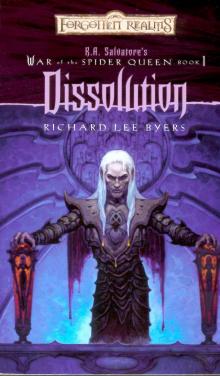 Dissolution
Dissolution Arkham Horror- Ire of the Void
Arkham Horror- Ire of the Void The Haunted Lands: Book II - Undead
The Haunted Lands: Book II - Undead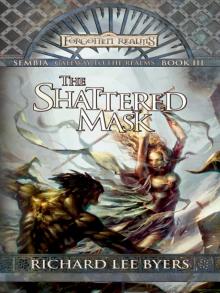 The Shattered Mask
The Shattered Mask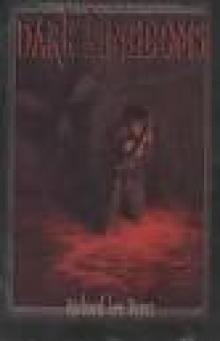 Dark Kingdoms
Dark Kingdoms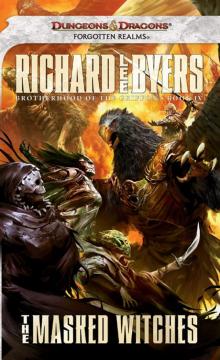 The Masked Witches: Brotherhood of the Griffon, Book IV
The Masked Witches: Brotherhood of the Griffon, Book IV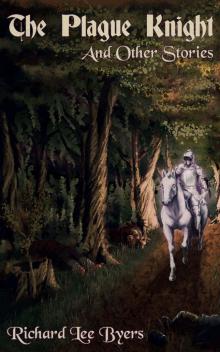 The Plague Knight and Other Stories
The Plague Knight and Other Stories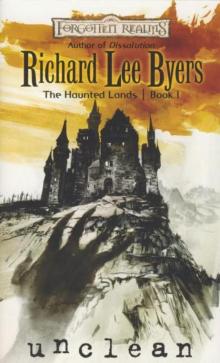 Unclean: The Haunted Lands
Unclean: The Haunted Lands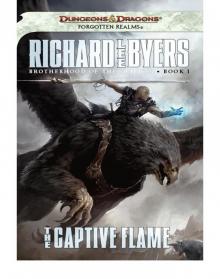 The Captive Flame: Brotherhood of the Griffon • Book 1
The Captive Flame: Brotherhood of the Griffon • Book 1 The Taste of Waterfruit and Other Stories (Story Portals)
The Taste of Waterfruit and Other Stories (Story Portals)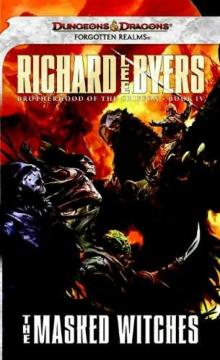 The masked witches botg-4
The masked witches botg-4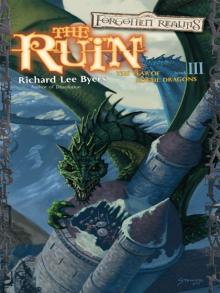 The Ruin
The Ruin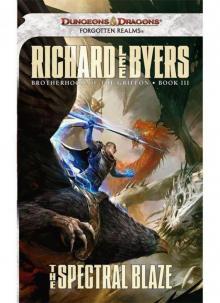 The Spectral Blaze botg-3
The Spectral Blaze botg-3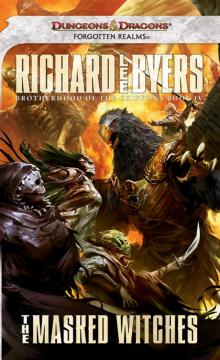 The Masked Witches
The Masked Witches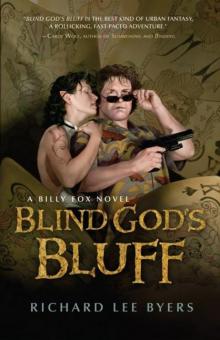 Blind God's bluff bf-1
Blind God's bluff bf-1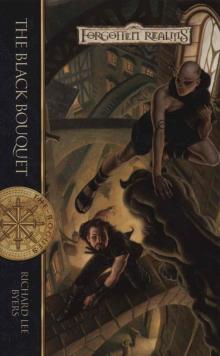 The Black Bouquet r-2
The Black Bouquet r-2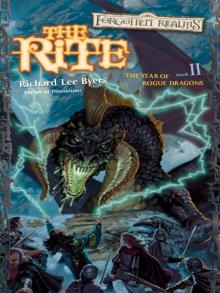 The Rite
The Rite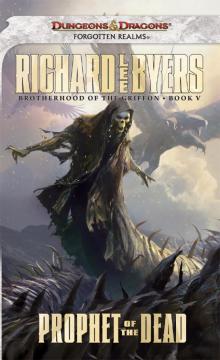 Prophet of the Dead: Forgotten Realms
Prophet of the Dead: Forgotten Realms The Shattered Mask s-3
The Shattered Mask s-3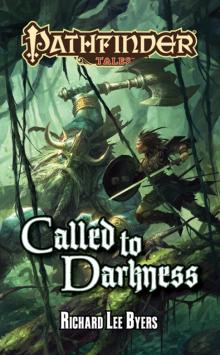 Called to Darkness
Called to Darkness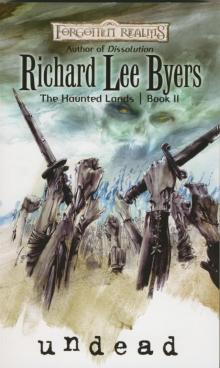 Undead hl-2
Undead hl-2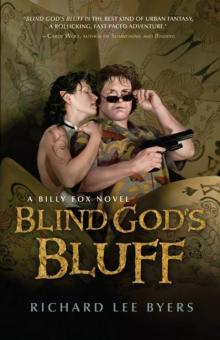 Blind God's Bluff: A Billy Fox Novel
Blind God's Bluff: A Billy Fox Novel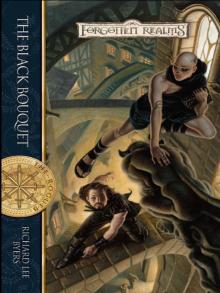 The Black Bouquet
The Black Bouquet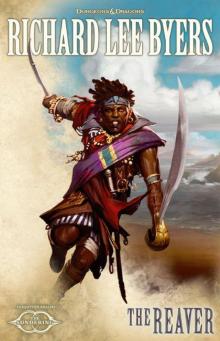 The Reaver
The Reaver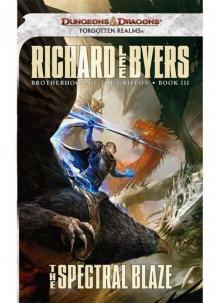 The Spectral Blaze: A Forgotten Realms Novel
The Spectral Blaze: A Forgotten Realms Novel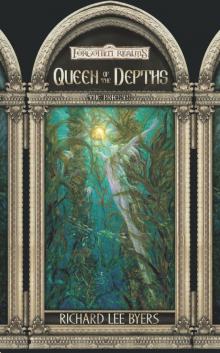 Queen of the Depths
Queen of the Depths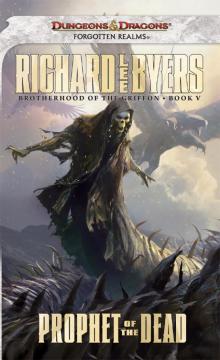 Prophet of the Dead botg-5
Prophet of the Dead botg-5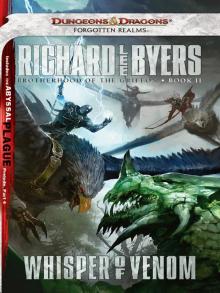 Whisper of Venom: Brotherhood of the Griffon, Book II
Whisper of Venom: Brotherhood of the Griffon, Book II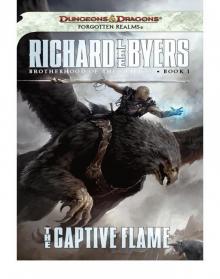 The Captive Flame botg-1
The Captive Flame botg-1 The Haunted Lands: Book III - Unholy
The Haunted Lands: Book III - Unholy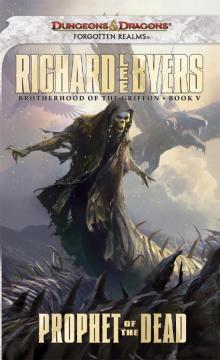 Prophet of the Dead
Prophet of the Dead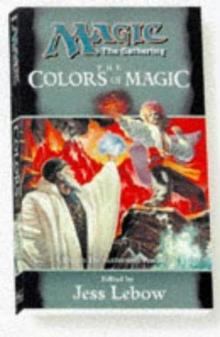 The Colors of Magic Anthology (magic: the gathering)
The Colors of Magic Anthology (magic: the gathering)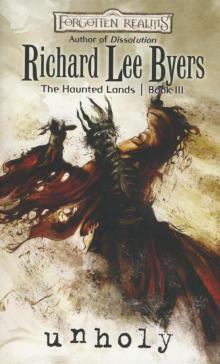 Unholy hl-3
Unholy hl-3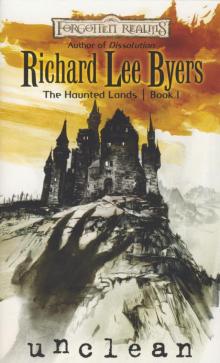 Unclean hl-1
Unclean hl-1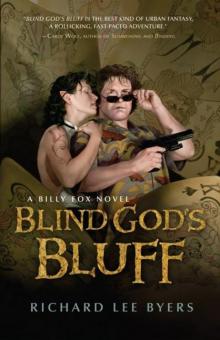 Blind God's Bluff
Blind God's Bluff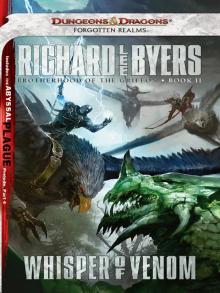 Whisper of Venom botg-2
Whisper of Venom botg-2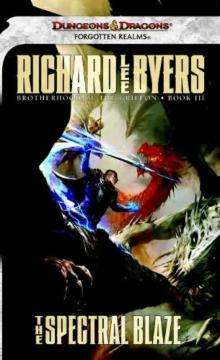 The Spectral Blaze
The Spectral Blaze